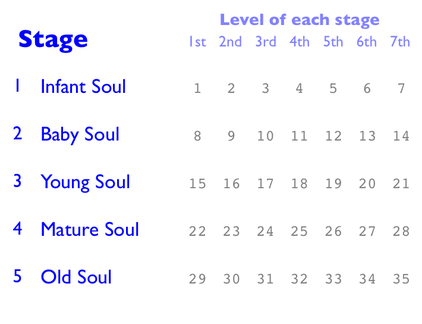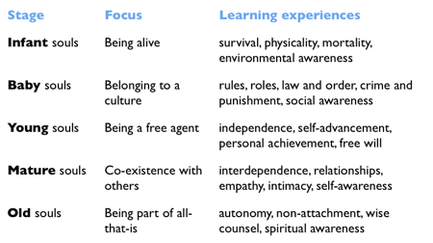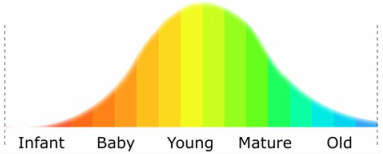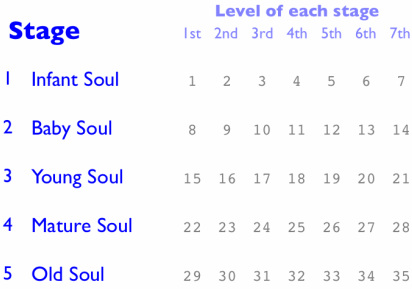According to many spiritual teachers, all human beings are, in reality, spiritual beings on a human journey.
We reincarnate as human beings in order to evolve as souls.
Our ultimate aim is to become fully conscious and capable as unique individual expressions of All That Is.
It is a long journey, but that’s okay because the soul is eternal.
We reincarnate as human beings in order to evolve as souls.
Our ultimate aim is to become fully conscious and capable as unique individual expressions of All That Is.
It is a long journey, but that’s okay because the soul is eternal.
Soul Evolution
|
The soul’s journey is really a process of evolving. This means growing in consciousness, steadily progressing through different levels or stages of consciousness.
How do we grow in consciousness? Through taking on challenging experiences in physical form. These cause us to make important 'soul-searching' choices and call upon us to discover our inner resources. But why in physical form? Why would a perfectly happy spiritual being decide to inhabit the physical realm with all of its limitations and difficulties? It is precisely so that we can experience the state of what feels like total separation from others and from the rest of reality. Only by going into this physically separated human form can we know ourselves as beings in our own right, and not just as … well … undifferentiated blobs of energy. |
Being physical throws our experiences and choices into extremely sharp relief in a way that is not possible otherwise. This is how we learn who we are and how to become all that we are.
In other words: "Choice and the ramifications of choice provide the essential lessons of life. In a very real sense, you choose to be here in order to make choices." Messages from Michael |
The 35 Steps
|
We are here to know ourselves and be all we can be, step by step. And according to the teachings of the entity known as Michael, there are 35 steps to the reincarnational process. The body and personality you have now are merely the vehicles you have chosen for this latest step in your journey.
But why 35 steps? Why not 36 steps? Or 10? Or 100? It is simply because, according to Michael, we go through five major stages of evolution through reincarnation. And, within each stage there are seven increments or levels to be completed. (Yes, it is rather like a computer game.) 5 x 7 = 35. Each single step requires a whole lifetime to complete. In fact, each step usually requires more than one lifetime. Typically, the entire journey of 35 steps takes well over a hundred lifetimes.
|
So let’s look at the journey in more detail. We’ll start with the five major stages of soul evolution through reincarnation.
|
The Five Stages
|
The Michael teachings describe a sequence of five 'cycles' or stages of soul evolution. They are named after the stages of human development:
Each of these five corresponds to a specific level of development in capability and self-awareness within the individual soul. Each stage is also characterised by a different learning focus that is more subtle than the previous ones. Dr Michael Newton
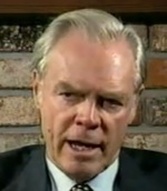
Incidentally, the same pattern of soul evolution has been identified by the hypnotherapist Dr Michael Newton.
His groundbreaking research was published in the best-selling book Journey of Souls: Case Studies of Life Between Lives (Llewellyn, 1994).(Also: 'Destiny of Souls') The books by Newton and his students draw upon thousands of transcripts of people who, under hypnotic regression, have re-experienced being between lives. From the higher perspective of their soul they are able to explain what happens after death and before birth. This includes information about the levels of consciousness through which reincarnating souls evolve.
What Newton and others have discovered is that souls between lives exist in light-form, and that each soul emanates a particular colour of the spectrum which indicates its current level of consciousness. |
The spectrum begins at white (all colours) but then goes through red, yellow, green, blue, to deep purple and violet. From low frequency to high frequency. The least evolved souls — the “newbies” — have a pinkish hue. The oldest souls — those nearing the end of the whole reincarnational cycle — have a blueish hue.
Although the spectrum is a continuum, Dr. Newton has found that it can be divided into five distinct stages or levels of evolvement, from Level I to Level V. These can be mapped onto the five stages given in the Michael teachings, from Infant soul to Old soul. So, for example, souls in the middle (or third) stage of reincarnation are referred to as 'Young souls' in the Michael teachings and they are at what Newton would call 'Level III'. They will have a yellowish or golden hue. (As an aside, both Newton and the Michael entity also identify higher levels of soul evolution which do not involve reincarnation.) The stages of reincarnation (or soul age) can also be likened to the stages of metamorphosis we see in nature, such as egg, caterpillar, chrysalis, butterfly. In reincarnation, though, what changes is not the physical form but the mode of consciousness, especially the form of self-awareness and — as a result — the way of relating to others. |
Soul Age and Personality
|
Soul age will affect how a personality comes across in certain ways:
Stage 1: Infant souls focus on immediate survival needs. They flourish in simple environments close to nature, such as remote tribes or rural, pastoral settings. In the context of modern society, however, they can come across as uncivilised simpletons or yokels, and may even be deemed to be psychopathic or have some sort of developmental disorder. Psychologically, they are naive, impulsive and 'pre-conventional', acting on impulse or habit with little or no thought for consequences. Because they lack both social understanding and self-inhibition, they are capable of committing antisocial or immoral acts without any sense of wrongdoing. As such, they do not fit well within modern society and may end up in prison or in psychiatric units.
While infant souls may lack the moral principles, social graces and cultural understanding of older souls, they are in a sense completely innocent, being without pretense or agenda. Stage 2: Baby souls, in contrast to Infant souls, think a great deal about their actions. Their lives are about safety, security, structure and order — rigidly so. Both their beliefs and their actions are largely rule-bound, so they are often ultra-conservative, traditionalist, orthodox, upright, moralistic, religiously devout, and mindful of law and order. That said, they will occasionally give in to temptation, or temper tantrum, and break the rules themselves — but then might find themselves tortured with guilt and shame. They come across to older souls as rather 'square' – conscientious, conventional, conformist.
Baby soul communities tend to be highly principled and civilised (think of the Amish). They are acutely aware of the rights and wrongs of people’s actions, including their own, though they have little insight into the motives behind them. Bad behaviour is sinful, and that’s that. Stage 3: Young souls tend to be extrovert, outward-bound, worldly, frenetically energetic, brash, competitive, political, ambitious and individualistic. They are more ego-driven than personalities at any other soul age, keen to prove themselves in the world at large. They like to think for themselves, assert their own opinions, and follow their own agenda, with a certainty that their own way is by far the best way. They are generally attracted to some form of worldly success — fame, fortune, power, glory. In fact, they are more fearful of death than souls at other stages, and those who aren’t sure about life after death may be anxious to make a big impact on the world stage – to create some kind of symbolic immortality for themselves. Young souls are acutely aware of their own goals and intentions but do not really question them. |
Stage 4: Mature souls tend to be thoughtful, reflective and sincere within themselves, and sensitive and empathetic towards others. Psychologically, their awareness is no longer egocentric (in the sense of being limited to a single perspective), but capable of accommodating multiple perspectives. In fact, the self-serving ego comes to be seen as a problem, something to be overcome — though in reality it is more a case of incorporating it into a broader level of awareness. This tension between ego and ego-transcendence, or between having both a personal agenda and a desire to be more open and authentic, makes life much more complicated — sometimes overwhelmingly so.
On the one hand, mature souls reject narrow-minded values. Yet on the other hand, they can empathise with whoever holds those same values. Fixed opinions are replaced by a sense of ever-shifting perspectives — “It all depends on how you look at it”. This disappearance of solid ground kicks off a search for deeper meaning and self-understanding — whether through art, psychology, philosophy or spirituality. Politically, mature souls tend to be liberal and inclusive, and disapprove of any kind of narrow chauvinism. To younger souls, they can come across as bleeding-heart liberals. They tend to question everything, including their own motives, and are prone to do a lot of soul-searching (literally). Stage 5: OId souls tend to exude some degree of depth, gravitas or wisdom that is quite unmistakable. Having moved beyond the conflicts of the mature soul, they are also lighter and have a sense of joyous freedom — the freedom to enjoy being very much in the world, but not of it. They are relatively calm, measured, untroubled and stable, unattached to social structures and cultural expectations, being sure of their own existence and inner strengths and their compassion for others. Their focus is on true self-expression and fulfillment, consciously participating in the evolution of all-that-is. As such, they tend to go their own unique way in life, letting go and letting be, in a detached way that may seem very weird and eccentric to younger souls. Late-stage old souls often focus on teaching spiritual wisdom with great compassion. Note: These descriptions emphasise the differences between stages. In reality, though, there is a gradual blend from one stage to the next. A person at the start of the Mature stage, for example, will act mostly like a Young soul but with elements of Mature soul nature beginning to emerge. |
The Lessons of Each Stage
|
Here are the five stages of soul evolution through human reincarnation, together with the typical learning experiences associated with each stage:
So we begin incarnating as Infant souls, complete novices at physical existence. At this first stage we are largely in a state of incompetence and terror, frankly. But through experiences and choices we learn and grow. We steadily progress from being Infant souls to Baby souls to Young souls to Mature souls. Finally, we enter the fifth stage as accomplished Old souls, the experts of human existence.
|
"As infant souls we learned about choices having to do with survival, as baby souls choices having to do with moral codes and ethics, as young souls choices having to do with mastery of achievement, as mature souls choices having to do with relationships, and as old souls choices having to do with the nature of oneness with the Tao.
An infant soul would therefore not understand the choices of an old soul although an older soul would likely have more understanding of the nature of younger soul choices, having had them." Michael, via Victoria Marina To look at each stage in more detail see: Stage 1. The Infant Soul Stage 2. The Baby Soul Stage 3. The Young Soul Stage 4. The Mature Soul Stage 5. The Old Soul |
Soul Levels in the Human Population
The Seven Steps within each Stage
|
Within each stage there are seven discrete steps to go through. In the Michael teachings, they are called 'levels', so in each stage we proceed from 1st level to 7th level.
Calling these 'levels' can be a bit confusing (since Newton refers to the five major stages as 'levels'), so I sometimes prefer to call them 'steps'. So each stage of reincarnation has seven distinct learning steps. For example, we begin the whole journey at step 1 as Infant souls, learn that lesson, then undertake step 2 as Infant souls, and so on. On completing the 7th step of the Infant stage, we then begin the 1st step of the Baby stage. The early steps in any stage are about experiencing life at this new stage of evolution, learning the essential lessons through appropriate experiences. The later steps are about expressing those lessons, demonstrating this level of consciousness in action. For example, in the Young soul stage, the first three steps — from 1st level Young soul to 3rd level Young soul — are about discovering the meaning of free will and self-determination; the last three steps — 5th level Young soul to 7th level Young soul — are about demonstrating the meaning of free will and self-determination in action. (The middle step — 4th level Young soul — is about consolidating the lessons learned.) |
The first step or level of any stage is like putting a toe in the water; the final step is like teaching others how to swim:
1st Level Initiation into the new stage. Toe in the water. First glimpses of the new consciousness. 2nd Level Building foundations. Wading in and out. Compare and contrast the old and new consciousness. 3rd Level Taking the plunge. Letting go of the prior stage. Actively exploring the new consciousness. 4th Level Relaxing into it, enjoying the water. Identification with this stage. Internal integration of the new consciousness. 5th Level Splashing about. “Look at me!” Going public with it. Expressing this level of consciousness. 6th Level Responsible swimming. Burning off any karma incurred. Harmonisation of one’s consciousness with others. 7th Level Mastery of consciousness at this level. Role model. Peak performance. What’s next? This sequence of seven steps is repeated through each stage, making 35 steps in all from the beginning of reincarnation to the end. In case you’re wondering, I’m at the 5th level of the Mature soul stage. My life’s lesson is about expressing my current stage of consciousness (multi-perspective, ego-transcending). |
Many Lives
|
So, we start our evolutionary journey at level 1 of stage1 (as '1st Level Infant souls') and end it at level 7 of stage 5 (as '7th Level Old souls').
There are 35 steps in all. And each single step requires at least one lifetime to complete. A single step can be done in one lifetime but often that’s too big a stretch, so an initial life may be undertaken as a taster, followed by one or two more which really go for it. Sometimes a life is interrupted, and the soul will just have to start over in the next life. Also, some lives are undertaken for reasons other than the specific intent to develop. For example, one lifetime might be undertaken primarily to assist another soul in their development. |
Some lives are taken on primarily for the death experience, for karmic reasons. These can be very short, of the order of days, weeks or months.
Taking into account all the gaps spent in the non-physical state between lives, a single step is typically accomplished in about 100-300 years of Earth time. The whole journey of 35 steps usually takes well over 100 lifetimes. Hence, the whole journey is likely to take of the order of 7,000-8,000 years, but possibly a lot more if the population is low and opportunities to incarnate are few. |
Questions and Answers
|
Coming back again and again sounds dreadful. Why don’t we just give up and be done with it? Can’t I just decide that this is my last time?
You cannot skip any of the steps, nor would you want to (from the soul’s perspective). You wouldn’t rent a movie but then skip to the final credits just to avoid the whole process of sitting through the movie. In fact, it’s more like a computer game. You are playing the game because you want to, and at some level you actually love it. And you know perfectly that you need to master one level before you can move on to the next level. That’s what the game is all about. Who says? There’s no tyrannical deity controlling the game, forcing you to keep at it, deciding who gets to 'graduate' and who doesn’t. It’s just the natural dynamic of life and the evolution of consciousness. A tadpole cannot suddenly transform into a full-grown frog. A baby human cannot suddenly take on a professional career or family responsibilities. There’s a natural, inevitable sequence to go through. And we’ve all signed up for it. But why? What’s it all about? Well, at the level of spirit or essence, all is one, all is love, all is joy. This is all very nice, but consciousness longs to experience more and more of what there is to experience, the utter richness and fullness of life. |
How does it do that?
By fragmenting [part of itself] into zillions of conscious entities, each of whom has its own experiences and perspective, and each of whom can make its own choices about what to experience. Any soul can choose to continue being submerged in all-that-is, albeit with little sense of self. Alternatively, any soul can choose to undergo the experience of life in a separate physical form, interacting with other souls in their own physical forms. This is the ultimate way to experience oneself as a self. And that’s why we are here? We have all made this choice: to use the human form as a vehicle to help us become more conscious of ourselves as the amazing beings we are. The aim is to experience every possible experience that enables us to emerge more and more consciously and fearlessly as ourselves. We begin as helpless infants for whom the experience of separate existence is quite terrifying. But we end as autonomous, self-realised beings for whom human existence is the most amazing way of being, feeling joyful and free and sharing love with the whole of life. |

